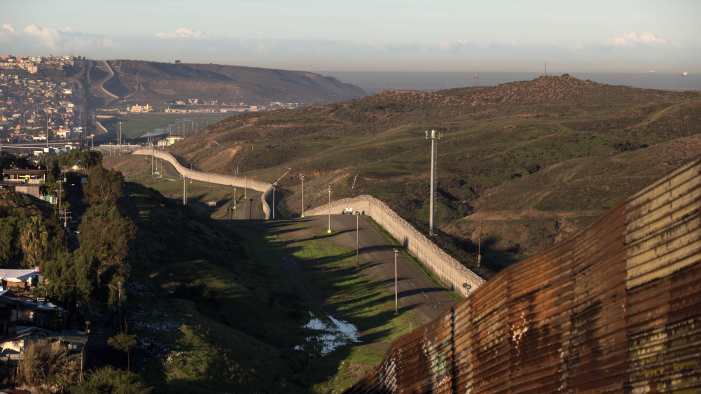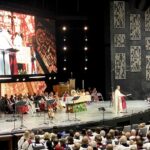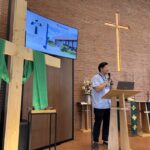In a panel discussion on immigration, World Relief Vice President Jenny Yang announced, “Human relationships are more important than theology.” She added, “Almost every major Biblical figure was a refugee.”
Hosted by the Catholic Information Center, in Washington, D.C., the panel on immigration featured Yang; Ashley Feasley, the Policy Director for the United States Conference of Catholic Bishops; and Nathan Bult, Vice President of Public and Government Affairs at Bethany Christian Services.
Although Yang prefaced her remarks with a comment on her desire to keep this talk apolitical, Feasley pointed out that immigration is now a political issue. The panel did, however, stay primarily informative, declining to propose any particular method for dealing with immigration, beyond suggesting a rework of the legal framework for legally crossing the border.
World Relief is a Baltimore-based Evangelical humanitarian nongovernmental organization that is a contract partner with the U.S. State Department in refugee resettlement.
Topics focused on the recent shift from immigrants being young men to entire families, the relationship between faith and social problems, and the human faces versus the simple numbers behind the refugee crisis.
Yang argued that the migrants are actually refugees (a semantic difference, hinging on the emphasis on refugees actively fleeing something). Central American migrants are fleeing persecutions on five grounds including religious, political, etc. Yang pointed out that the U.S. turned Jews back from its shores before and during World War II, and after the war pledged never to do so again, implying similarities between the current refugee crisis and the Holocaust. Moving to discuss the poor legal framework for applying for citizenship, Yang argued that the validity of the applicant’s legal process, not the validity of the claim itself, decides the migrant’s case for entry to the U.S. The process itself is more important than the claim of persecution or the refugee’s immediate need for asylum.
Feasley, of the United States Conference of Catholic Bishops, primarily added to Yang’s points, and explained the change to families crossing the border, from mostly young men. Latinos increasingly see “no choice” between life and death in their country of origin. Furthermore, families are displaced locally, an average of three times, before they attempt to cross the U.S.-Mexico border. They agree, as a unit, to attempt to enter the U.S. Originally, it was primarily younger people simply looking for a better life. Most want to comply with American law and processes. Both are simply so convoluted it is extremely difficult to comply fully. Feasley also added that Catholic social teaching finds two rights on this topic for people: the right to migrate, and the right not to migrate. Those fleeing Central American governments have the right to migrate to escape, but they should also feel free (and safe) enough not to migrate from their country in the first place.
Bult, of Bethany Christian Services, focused upon bringing the human aspect of the issue home. He told personal anecdotes, like the story of José, who was shot protecting his younger brother during a gang raid on his church building. Bult pointed out that every number has human faces behind it, and he encouraged the audience to find those human faces in order to bring the crisis home. He ended by backing Feasley’s point that immigrants do want to comply; it is simply difficult to do so.
A panel followed the talks. The first question asked about each members’ reasons for getting into immigration policy and advocacy. Feasley met a Lithuanian refugee in school, who spoke no English. They are still friends, and Feasley was inspired to work in immigration from that point. Yang is, herself, a Korean immigrant who came with her family from Korea in the 1970s. She shares some of the same struggles as immigrants and learned about the negative views of immigrants today. She is also concerned about the poor Evangelical response to immigration. Bult, similarly to Feasley, was influenced by the Sudan Lost Boys and Girls crisis to work in immigration policy and adoption services. His parents, also, were sympathetic to immigrants when he was younger, and Bult worked in immigration policy in the Trump Administration for a time.
All three panelists suggested reporters as the best source for immigration news, especially those close the border. Christianity Today hired a dedicated refugee reporter, Yang added.
Groups like World Relief and Bethany need volunteers, and local Catholic charities take trips to places in need of help. Yang emphasized the need for a balance of compassion versus the rule of law. Both are vital for a functional immigration system.
One question raised mentioned an elephant in the room: violent criminals entering via the border. Bult spoke to this, pointing out that it’s not a good idea for a terrorist to cross a border illegally, or go through two years’ or more worth of bureaucratic tape. Again, the recent shift to entire families immigrating has reduced the number of single, violent, young men entering the country.
More topics than these were covered in the panel discussion. For the full discussion, visit: https://cicdc.org/event/christianity-at-the-border-immigration-today.
No comments yet





Leave a Reply